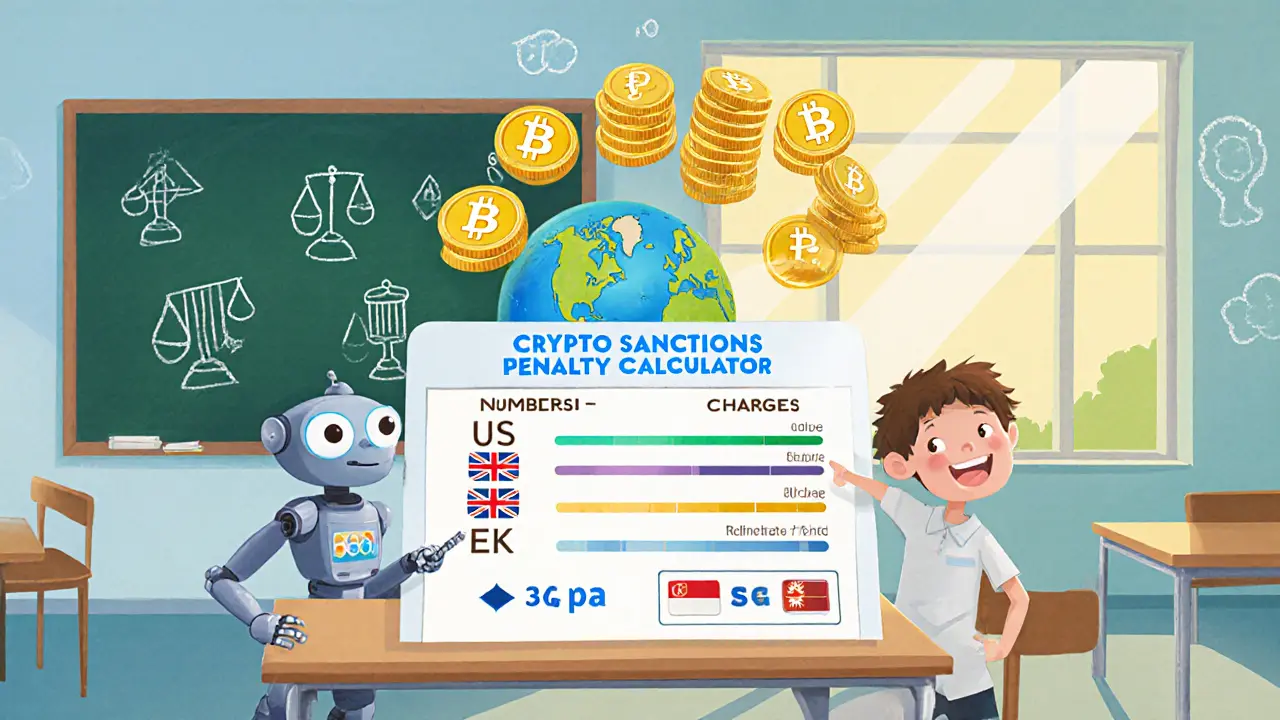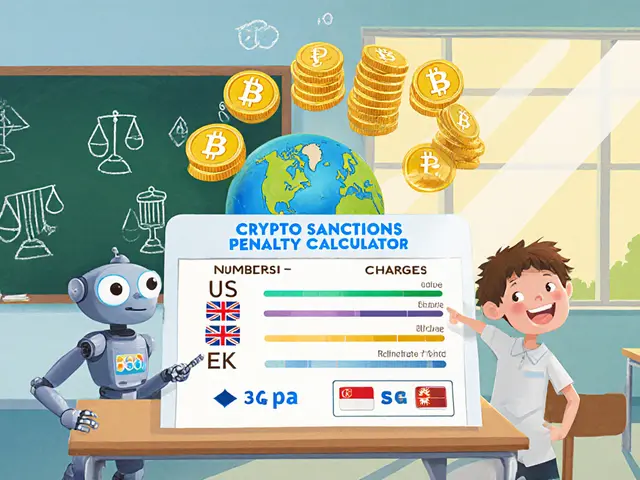Crypto Sanctions Penalty Calculator
Prison Sentence
0 years
Based on consecutive sentencing
Maximum Fine
$0
Including asset forfeiture
Key Charges (Examples)
Legal Risk Factors
- Consecutive sentencing increases total time
- Asset forfeiture possible
- Personal liability for executives
- International cooperation in investigations
Quick Takeaways
- Sanctions breaches using crypto can trigger up to 30‑year prison terms in the US and UK.
- OFSI, DOJ and OFAC now treat crypto assets like cash - passive compliance is no longer enough.
- Major cases (OKX, Evita, North Korean laundering) show how multiple charges stack up to decades behind bars.
- Robust AML/KYC, blockchain analytics and real‑time screening are essential to avoid criminal liability.
- Executives and senior staff can face personal criminal prosecution if oversight fails.
When regulators talk about crypto sanctions evasion the illegal use of digital assets to bypass international sanctions, money‑laundering rules or export controls, they’re treating it the same as moving cash through a bank. That shift means fines that once topped out at a few hundred thousand pounds now sit alongside jail terms that can stretch for thirty years. Below we break down why the penalties have skyrocketed, which authorities are leading the charge, and how firms can protect themselves before they end up in a courtroom.
Why Crypto Became a Hot Target for Sanctions Enforcement
Cryptocurrency’s borderless nature makes it a perfect conduit for moving value without traditional intermediaries. From 2022 to early 2025, the UK Office for Financial Sanctions Implementation (OFSI the UK body responsible for enforcing financial sanctions) tracked a steep rise in crypto‑related breaches. Their July2025 threat assessment warned that crypto firms can’t simply block suspicious transfers - they often can’t reject incoming payments at all, turning a compliance weakness into a criminal liability.
Globally, enforcement action climbed 39% in 2024, topping $5.1billion in penalties. The United States accounted for nearly half of that amount, while the Asia‑Pacific region recorded a 55% year‑on‑year surge, driven by new rules in Singapore and Japan. The pattern is clear: regulators see crypto as a fast‑moving, high‑risk asset class that must be monitored just like cash.
How Multiple Charges Add Up to Decades Behind Bars
U.S. prosecutors rarely file a single count for crypto sanctions violations. Instead, they stack conspiracy, money‑laundering, wire fraud, bank fraud, and the specific sanctions violation itself. Each count carries its own statutory maximum - conspiracy (up to 20years), money‑laundering (up to 20years), bank fraud (up to 30years), wire fraud (up to 20years) and sanctions violations (up to 30years). When judges order sentences to run consecutively, the total exposure can easily exceed thirty years.
Legal experts note that the “30‑year” headline isn’t a single sentence for a single crime; it’s the cumulative effect of several serious felonies. That’s why the headline‑grabbing cases below matter - they illustrate how the law is being applied in real‑world prosecutions.
Landmark Cases that Shaped the New Landscape
OKX Crypto Exchange - In February2025, the U.S. Department of Justice (DOJ the federal agency that enforces criminal law in the United States) levied a $500million fine on the exchange for facilitating $5billion in suspicious transfers, including sanctioned entities. Prosecutors proved that OKX staff instructed American users to falsify identification, directly violating sanctions and AML rules. The company faced civil penalties and the executives involved are now under criminal investigation, with potential sentences that could add up to 30years.
IuriiGugnin and Evita Payments - A June2025 indictment revealed that the founder used his crypto payment platform to move over $500million for Russian‑linked entities despite U.S. sanctions. The charges spanned wire fraud, bank fraud, operating an unlicensed money‑transmitting business, and sanctions evasion. If convicted on all counts, Gugnin faces a stacked sentence well beyond the 30‑year mark.
North Korean Crypto Laundering - Federal investigators filed a civil forfeiture complaint in June2025 targeting more than $7.74million of crypto that had been siphoned through a network of IT workers abroad. The complaint highlighted sophisticated layering techniques that moved funds back to the North Korean regime, underscoring how state actors exploit crypto to evade sanctions.
These prosecutions send a clear signal: regulators are no longer treating crypto sanctions breaches as minor compliance glitches. They are now prosecuting them as organized criminal enterprises.

Comparing Penalties Across Key Jurisdictions
| Jurisdiction | Maximum Prison Term | Typical Fine Range | Key Statutes |
|---|---|---|---|
| United States | 30years (per count, consecutive possible) | $1billion+asset forfeiture | 18U.S.C.§2339A (Sanctions), 18U.S.C.§1349 (Bank Fraud), 18U.S.C.§1956 (Money Laundering) |
| United Kingdom | 10years (individual) - up to 30years when combined with fraud offenses | £5million+civil recovery | Sanctions and Anti‑Money‑Laundering Act 2018, Criminal Finances Act 2017 |
| European Union | 20years | €500million+fines per transaction | EU Regulation2015/849 (AMLD5), Council Regulation2021/1032 (Sanctions) |
| Singapore | 15years | S$2million+asset seizure | Corruption, Drug Trafficking and Other Offences (Penalties) Act, MAS Guidelines |
What Compliance Teams Must Do Right Now
Regulators have stopped accepting “nice‑to‑have” compliance programs. Below is a practical checklist that aligns with OFSI’s July2025 expectations and the DOJ’s recent enforcement focus.
- Implement real‑time blockchain analytics. Tools must flag sanctioned addresses within seconds, not days.
- Expand KYC to cover indirect ownership. Beneficial‑owner data must be collected for every wallet that interacts with your platform.
- Automate SAR filing. Any transaction exceeding £10,000 (or equivalent) that matches a sanctioned address triggers an automatic Suspicious Activity Report.
- Run regular sanctions screening drills. Simulate a high‑volume attack to test system resilience.
- Document “reasonable procedures”. Keep detailed logs showing how your AML policy meets the UK “Failure to Prevent Fraud” test.
- Train senior staff. Executives must understand personal criminal exposure, not just corporate fines.
Failing any of these steps can be interpreted as willful blindness, a factor that prosecutors cite when they push for the maximum prison term.
How Individuals Can Protect Themselves
If you’re a trader, investor or simply using a crypto wallet, remember that personal liability can arise from “knowing participation”. Here are three quick safeguards:
- Never process payments for entities you can’t verify - a brief check on sanctioned‑person lists can save you.
- Keep a clear audit trail of every transaction, including screenshots of compliance checks.
- If your platform asks you to bypass KYC, refuse. Refusal can be used as a defense if prosecutors come after you.
Future Outlook: Even Tougher Enforcement Ahead
Industry observers agree the next wave will focus on RICO‑style prosecutions that treat crypto sanctions evasion as part of a larger criminal enterprise. The UK’s “Failure to Prevent Fraud” offense is being expanded to cover crypto‑specific fraud schemes, and the EU is drafting a unified sanctions‑screening API for all blockchain participants.
In short, the regulatory environment is moving from reactive fines to proactive criminal prosecution. Companies that invest in compliance now will avoid the “30‑year” headlines that dominate the news cycle.
Frequently Asked Questions
What is a “crypto sanctions evasion” charge?
It is a criminal offense that occurs when a person or entity uses digital assets to move money to or from a person, group or country that is listed on an international sanctions regime. The same statutes that apply to cash transfers apply to crypto, meaning the offense can carry the same maximum prison terms.
How can a 30‑year sentence be imposed for a crypto case?
Prosecutors typically stack multiple felony counts - conspiracy, money laundering, wire fraud, bank fraud and the specific sanctions violation. Each count has its own statutory maximum, and when a judge orders them to run consecutively the total can exceed 30 years.
Which regulators are most aggressive in 2025?
The U.S. Department of Justice, the UK Office for Financial Sanctions Implementation (OFSI), and the U.S. Office of Foreign Assets Control (OFAC) have led the most high‑profile prosecutions, followed closely by regulators in the EU, Singapore and Japan.
What are the most common compliance failures?
Missing real‑time sanctions screening, weak KYC on indirect beneficiaries, failure to file SARs promptly, and lack of documented “reasonable procedures” for fraud prevention are the top gaps cited in enforcement actions.
Can an individual be imprisoned for using a sanctioned crypto wallet?
Yes, if prosecutors can prove the person knowingly transferred funds to a sanctioned address or helped conceal the transaction. Ignorance is not a defense if the individual should have performed due diligence.
Staying ahead of the regulatory curve isn’t just about avoiding fines - it’s about protecting freedom. By treating crypto sanctions compliance as a core business function, firms and individuals can keep the 30‑year headlines out of their future.



Ciaran Byrne
October 1, 2025 AT 19:33Real‑time blockchain analytics are now a non‑negotiable baseline for any crypto‑centric firm. If your screening tools lag even by a few minutes, regulators will see that as willful blindness. Integrate address‑watchlists directly into the transaction pipeline and keep audit logs immutable.
Patrick MANCLIÈRE
October 1, 2025 AT 20:56Adding to that, the UK’s OFSI has made it clear that “reasonable procedures” must be documented end‑to‑end. It isn’t enough to have a policy on paper; you need screen‑captures of every SAR filing, timestamps, and a clear escalation path. Senior management should personally sign off on the compliance framework, otherwise they risk personal prosecution. The penalty calculator you shared is a good start, but the real work is in the day‑to‑day monitoring. Treat compliance as a product feature, not a checkbox.
Carthach Ó Maonaigh
October 1, 2025 AT 22:20Yo, if you’re still using spreadsheets for AML, you’re basically handing criminals a free ride.
Marie-Pier Horth
October 1, 2025 AT 23:43Think of sanctions compliance as a never‑ending chess game. Each new address you add to a watchlist is a move that forces the opponent to rethink their strategy. In practice this means updating your node’s blacklist every few hours, not once a month. The DOJ has already demonstrated that they can trace even a single missed address back to a corporate officer.
Lana Idalia
October 2, 2025 AT 01:06It’s fascinating how quickly the narrative shifted from “just a technical glitch” to “organized crime” in the courts. The evidence from the OKX case shows that prosecutors are digging into internal chat logs, not just blockchain data. If you’re not already logging employee communications around sanctions decisions, you’re leaving a huge evidentiary gap.
Henry Mitchell IV
October 2, 2025 AT 02:30👍 Real‑time alerts are a must. When a flagged address appears, the system should auto‑freeze the funds and raise a ticket for a compliance analyst. No manual overrides – that’s what gets you sued. Also, keep the UI clean; a bright red banner works better than a vague yellow notice.
Kamva Ndamase
October 2, 2025 AT 03:53Listen up, crypto startups: you can’t hide behind “decentralised” as an excuse. Regulators are hunting for the people who design the wallets and the smart contracts that enable sanctions evasion. If your code lets anyone slip a sanctioned address through, you’re on the hook for the whole operation. Put a hard‑coded deny‑list in the contract and audit it annually.
bhavin thakkar
October 2, 2025 AT 05:16The drama isn’t just in the headlines; it’s in the forensic details. When prosecutors pull up a chain of transactions, they trace each hop like a detective story. Every hidden mixer, every dusting technique – they’re all clues. If you want to stay out of the courtroom, treat each transaction as if it could be your last.
Thiago Rafael
October 2, 2025 AT 06:40From a legal standpoint, the cumulative effect of multiple felony counts cannot be overstated. Judges routinely impose consecutive sentences when they find the defendant acted with deliberate intent. Your compliance program should therefore aim to demonstrate a lack of intent, not merely a lack of knowledge.
WILMAR MURIEL
October 2, 2025 AT 08:03When I first read about the 30‑year headlines, I thought it was sensationalism, but the cases actually lay out a meticulous stacking of charges that any seasoned attorney can see coming. Take the OKX enforcement action – it wasn’t just a single violation; it spanned sanctions breaches, wire fraud, money‑laundering, and even conspiracy to defraud. Each of those statutes carries its own maximum penalty, and when the court orders them to run consecutively the total aggregates well beyond the headline figure. What’s more, the prosecutors in that case demonstrated a deep dive into internal communications, showing that senior staff personally directed the illicit flows. That level of personal involvement is what turns a corporate fine into a personal criminal risk. In the Evita Payments case, the founder faced similar stacking, but the court also highlighted the use of sophisticated layering techniques to obscure the origin of funds. Those layers, while technically clever, signaled to the court a willful attempt to defeat regulatory oversight. The North Korean laundering case adds another layer of complexity, as it showcases state‑backed actors exploiting the same crypto channels, forcing governments to treat these violations as national security threats. This trend, where crypto is no longer a peripheral concern but a central conduit for sanctioned finance, is driving a shift in prosecutorial strategy. Regulators are now collaborating across borders, sharing blockchain analytics, and coordinating simultaneous raids. The practical takeaway for any compliance team is that siloed efforts are insufficient; you need a unified, real‑time monitoring system that can flag, freeze, and report suspicious activity without human delay. If you can’t afford a dedicated crypto‑forensics team, you should at least outsource to a vetted provider with proven KYC/KYB capabilities. Finally, remember that personal liability extends to executives who ignore or override these controls. Even if the company is acquitted, an individual can still face decades in prison if they’re found to have knowingly facilitated the violations. The bottom line is clear: treat crypto sanctions compliance as a core business function, invest in the right technology, and embed accountability at every tier of leadership. Only then can you hope to avoid the 30‑year headlines that dominate today’s news cycle.
karyn brown
October 2, 2025 AT 09:26Yo, these fines are massive but the real horror story is the personal time you could lose. If you’re not checking the watchlists, you might end up behind bars, no joke.
Megan King
October 2, 2025 AT 10:50Just a heads‑up: the best way to stay safe is to make compliance part of your daily routine, not something you bolt on at the end of the quarter. Small habits add up.
Sabrina Qureshi
October 2, 2025 AT 12:13Wow!!! This is a massive shift!!! Regulators are not playing around!!! Every crypto firm must treat sanctions like cash!!!
Rahul Dixit
October 2, 2025 AT 13:36Don’t be fooled by the “decentralised” buzz; it’s exactly the narrative the deep‑state loves to push to mask their own surveillance capabilities. If you think you’re invisible, you’re dead wrong.
CJ Williams
October 2, 2025 AT 15:00From a philosophical angle, the rise of crypto sanctions enforcement forces us to reconsider the nature of financial sovereignty. When a global network can be weaponised, the ethical duty of every participant becomes paramount.
mukund gakhreja
October 2, 2025 AT 16:23Sure, regulators love their paperwork, but if you ignore the simple rule of “don’t send money to a banned address,” you’ll be the punchline of the next DOJ press release.
Michael Ross
October 2, 2025 AT 17:46Keeping a clear chain of custody for each transaction can simplify any later investigation and demonstrate good faith.
Deepak Chauhan
October 2, 2025 AT 19:10In accordance with prevailing statutes, it is imperative that entities implement robust sanctions screening mechanisms, thereby mitigating exposure to punitive measures.
Aman Wasade
October 2, 2025 AT 20:33Oh great, another “big brother” update – because what the world really needed was more government watch over crypto.
Gregg Woodhouse
October 2, 2025 AT 21:56Honestly, most of these cases are just regulators looking for a headline. If you have basic KYC, you’ll be fine.
Ron Hunsberger
October 2, 2025 AT 23:20Practical tip: use an API that updates sanctions lists hourly and integrate it directly into your transaction validation layer.
Joyce Welu Johnson
October 3, 2025 AT 00:43Remember, the cost of compliance is nothing compared to the cost of a 30‑year sentence for a single executive.
Ally Woods
October 3, 2025 AT 02:06Just think of compliance like brushing your teeth – do it every day and you won’t end up with nasty stuff later.
Raj Dixit
October 3, 2025 AT 03:30Short and sweet: ignore sanctions at your peril.
Lisa Strauss
October 3, 2025 AT 04:53Let’s keep the conversation positive – investing in solid AML tools boosts both security and investor confidence.
Brooklyn O'Neill
October 3, 2025 AT 06:16Great discussion, everyone. It’s clear that a collaborative approach to compliance will benefit the whole ecosystem.